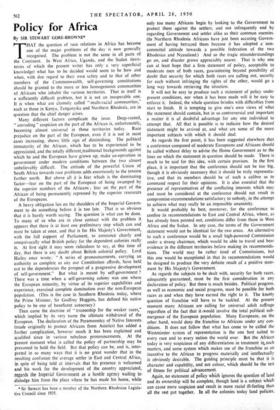Policy for Africa
By SIR STEWART GORE-BROWNE•
THAT the question of race relations in Africa has become one of the major problems of the day is now generally recognised. The problem is not the same in all parts of the Continent. In West Africa, Uganda, and the Sudan (terri- tories of which the present writer has only a very superficial knowledge) what has to be decided would seem to be how and when, with due regard to their own safety and to that of other members of the Commonwealth, self-governing constitutions should be granted to the more or less homogeneous communities of Africans who inhabit the various territories. That in itself is a sufficiently difficult problem, but it is not an insuperable one. It is when what are clumsily called " multi-racial communities," such as those in Kenya, Tanganyika and Northern Rhodesia, are in question that the chief danger arises.
Many different factors complicate the issue. Deep-rooted, " corroding " suspicion on the part of the African is, unfortunately, becoming almost universal in those territories today. Race prejudice on the part of the European, even if it is not in most cases increasing, shows little sign of diminishing. The political immaturity of the African, which has to be experienced to be appreciated, and the totally different traditionalbackgrounds against which he and the European have grown up, make co-operation in government under modern conditions between the two almost unbelievably difficult. The attitude of the powerful Union of South Africa towards race problems adds enormously to the tension further north. But above all it is fear which is the dominating factor—fear on the part of the European of being swamped by the superior numbers of the Africans ; fear on the part of the African of being permanently repressed by the superior resources of the Europeans.
A heavy obligation lies on the shoulders of the Imperial Govern- ment to do something before it is too late. That is so obvious that it is barely worth saying. The question is what can be done. To many of us who are in close contact with the problem it appears that there is at least one preliminary step which can and must be taken at once, and that is fox His Majesty's Government, with the full support of Parliament, to announce clearly and unequivocally what British policy for the dependent colonies really is. At first sight it may seem ridiculous to say, at this time of day, that there is any doubt about British colonial policy. Lord Halley once wrote: " A series of pronouncements, carrying an authority as complete as any our Constitution affords, have held out to the dependencies the prospect of a progressive development of self-government." But what is meant by self-government ? There was a time when a self-governing colony was one where the European minority, by virtue of its superior capabilities and experience, exercised complete domination over the non-European population. (This is the case in Southern- Rhodesia today, where the Prime Minister, Sir Godfrey Huggins, has defined his native policy to be one of beneficent autocracy.) Then came the doctrine of " trusteeship for the weaker races," which implied by its very name the ultimate withdrawal of the European. The declaration of the Paramountcy of Native Interests (made originally to protect Africans from Asiatics) has added a further complication, however much it has been explained and qualified since in various nebulous pronouncements. At the present moment what is called the policy of partnership may be presumed to hold the field. But that policy can be, and is, inter- preted in so many ways that it is no great wonder that in the resulting confusion the average settler in East and Central Africa, in spite of being told at intervals that his presence is welcomed and his work for the development of the country appreciated, regards the Imperial Government as - a hostile agency waiting to dislodge him from the place where he has made his home, while • Sir Stewart has been a member of the Northern Rhodesian Legisla- tive Council since 1935. only too many Africans begin by looking to the ,Government to protect them against the settlers, and not infrequently end by regarding Government and settler alike as their common enemies.
(In Northern Rhodesia Africans have just been accusing Govern- ment of having betrayed them because it has adopted a - non- committal attitude towards a possible federation of the two Rhodesias and Nyasaland.) And so the tragic misunderstandings go on, and disaster grows appreciably nearer. That is why one can at least hope that a firm statement of policy, acceptable to moderate men of both races, guaranteeing beyond possibility of doubt that security for which both races are calling out, security for each without infringing the rights of the other, would go a long way towards retrieving the situation.
It will not be easy to produce such a statement of policy under present conditions, nor when it has been made will it be easy to enforce it. Indeed, the whole question bristles with difficulties from start to finish. It is tempting to give one's own views of what the statement should contain, but in so controversial and important a matter it is of doubtful advantage for any one individual to attempt that. All that is possible is to indicate how the desired statement might be arrived at, and what are some of the more important subjects with which it should deal.
As regards the first point, it has been suggested elsewhere that a conference composed of moderate Europeans and Africans should be called without delay to advise the Home Government as to the lines on which the statement in question should be made. There is much to be said for this idea, with certain provisos. In the first place, it is important that the conference should not be too big, though it is obviously necessary that it should be truly representa- tive, and that its members should be of such a calibre as to command respect for their opinions. It is also essential that the presence of representatives of the conflicting interests which may and must be considered at the conference should not result in compromise-recommendations satisfactory to nobody, in the attempt to achieve what may really be an impossible unanimity.
It would probably be best, moreover, for the conference to confine its recommendations to East and Central Africa, where, as has already been pointed out, conditions differ from those in West Africa and the Sudan. In any case, the terms of the Government statement would not be identical for the two areas. An alternative to such a conference would be a small high-powered Commission under a strong chairman, which would be able to travel and hear evidence in the different territories before making its recommenda- tions. The world may be rather tired of Commissions, but this one would be exceptional in that its recommendations would be designed to produce the very definite result of a positive state- ment by His Majesty's Government.
As regards the subjects to be dealt with, security for both races, adequately guaranteed, must be the first consideration in any declaration of policy.• But there is much besides. Political progress, as well as economic and social progress, must be possible for both races as and when they have earned the right to it. The knotty question of franchise will have to be tackled. At the present moment many Africans are calling for universal adult suffrage regardless of the fact that it.would involve the total political sub- mergence of the European population. Many Europeans, on the other hand, would deny the franchise to Africans under any con- ditions. It does not follow that what has come to be called the Westminster system of representation is the one best suited to every race and to every nation the world over. But the African today is very suspicious of any differentiation in treatment in,such matters, and some system which makes use of the franchise as an incentive to the African to progress materially and intellectually is obviously desirable. The guiding principle must be that it is character and capability, and not colour, which should be the test of fitness for political advancement.
Again, no statement of policy which ignores the question of land and its ownership will be complete, though land is a subject which can cause more suspicion and result in more racial ill-feeling than all the rest put together. In all the colonies today land policies,
some more satisfactory than others, are in force, and It is imperative that nothing should be said or done which will give the impression that the Imperial Government is in any way going back on promises made in the past. A clear re-statement of policy may, however, in some cases be desirable.
Opportunity, too, must be provided for the possible re-grouping of territorial units when such a course is shown to be in the best interests of their inhabitants, a particularly thorny subject at the present moment. It must be emphasised, moreover, that any state- ment of policy such as we are considering, while avoiding the ambi- guities and lack of definition which have done so much harm in the past, and while providing rigid guarantees against any possible re- versal of policy in the future (an essential point if confidence is to be restored), must somehow manage to be sufficiently adaptable to meet the needs of the rapidly changing world in which we all— Europeans and Africans alike—live today, and sufficiently elastic to apply to territories which are at different stages of development.











































 Previous page
Previous page